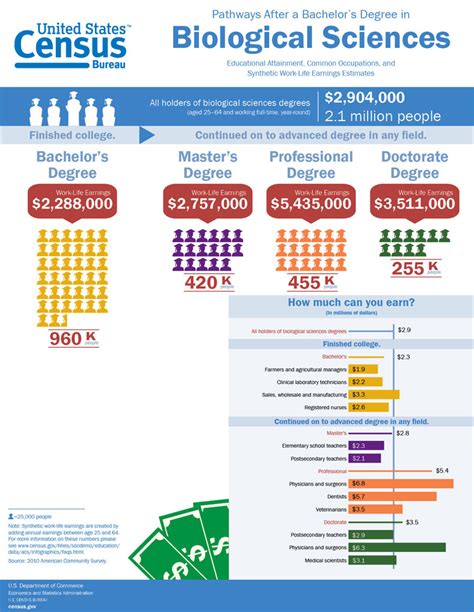A degree in biological sciences can open doors to a wide range of exciting and rewarding careers. With a solid foundation in biology, you’ll be equipped with the knowledge and skills to explore the complexities of life and contribute to scientific advancements.

Education and Research
1. Teachers:
– Teach biology at high schools, middle schools, and elementary schools.
– Develop curricula, lesson plans, and assessments.
– Inspire students and foster a passion for science.
2. Professors:
– Conduct research in universities and colleges.
– Teach courses in biology, genetics, ecology, and related fields.
– Mentor students and guide their academic and professional development.
3. Researchers:
– Investigate biological phenomena at research institutions, universities, and hospitals.
– Use advanced techniques to study cellular and molecular processes, disease mechanisms, and environmental interactions.
– Publish findings in scientific journals and present at conferences.
Healthcare
1. Biological Scientists:
– Analyze biological samples to diagnose and treat diseases.
– Develop and test new therapies and medications.
– Conduct clinical trials to evaluate the safety and efficacy of treatments.
2. Physicians:
– With additional medical training, individuals with a biology degree can become physicians. They diagnose and treat human diseases, prescribe medications, and provide medical care.
3. Veterinarians:
– Care for animals by diagnosing and treating diseases, performing surgeries, and administering vaccinations.
Industry
1. Environmental Scientists:
– Study the impact of human activities on the environment.
– Monitor air, water, and soil quality.
– Develop solutions to environmental problems.
2. Agricultural Scientists:
– Improve crop yields and livestock production through genetic engineering, breeding techniques, and pest control.
– Develop sustainable agricultural practices.
3. Biotechnology Scientists:
– Apply biological principles to develop new technologies in fields such as medicine, agriculture, and energy.
– Engineer genetically modified organisms and biomaterials.
Consulting and Policy
1. Science Writers:
– Write and edit scientific articles, reports, and books for a variety of audiences.
– Translate complex scientific information into clear and engaging language.
2. Science Policy Advisors:
– Provide scientific expertise to policymakers and government agencies.
– Evaluate the impact of scientific research on policy decisions.
– Advocate for evidence-based policies.
Other Applications
In addition to the traditional career paths listed above, a degree in biological sciences can open doors to a range of other innovative applications:
1. Biomimicry: Studying biological systems to develop sustainable solutions for human challenges, such as creating self-healing materials inspired by the regenerative abilities of salamanders.
2. Synthetic Biology: Designing and constructing new biological systems that do not exist in nature, with applications in medicine, energy, and materials science.
3. Precision Medicine: Using genetic information to tailor medical treatments to individual patients, improving outcomes and reducing side effects.
4. Computational Biology: Applying computational methods to analyze biological data and predict outcomes, such as using machine learning to identify new drug targets.
5. Neurotechnology: Developing technologies that interface with the human nervous system, enabling advancements in prosthetics, brain-computer interfaces, and treatments for neurological disorders.
Table 1: Employment Outlook for Biological Scientists
| Occupation | Median Annual Salary | Projected Job Growth |
|---|---|---|
| Biological Scientists | $95,140 | 5% |
| Medical Scientists | $92,440 | 8% |
| Epidemiologists | $78,070 | 9% |
| Environmental Scientists and Specialists | $73,520 | 8% |
| Agricultural Scientists | $67,440 | 9% |
(Source: Bureau of Labor Statistics, U.S. Department of Labor, 2021)
Table 2: Median Annual Salaries for Biological Scientists by Industry
| Industry | Median Annual Salary |
|---|---|
| Research and Development | $99,930 |
| Healthcare | $94,860 |
| Government | $92,160 |
| Educational Services | $88,110 |
| Manufacturing | $86,230 |
(Source: Bureau of Labor Statistics, U.S. Department of Labor, 2021)
Table 3: Career Paths for Biological Scientists
| Career Path | Education Requirements |
|---|---|
| Teacher | Bachelor’s degree in biology or related field; teaching certification |
| Professor | Doctor of Philosophy (PhD) in biology or related field |
| Researcher | Master’s degree or PhD in biology or related field |
| Biological Scientist | Bachelor’s or Master’s degree in biology or related field |
| Physician | Medical degree (MD) or Doctor of Osteopathic Medicine (DO) |
| Veterinarian | Doctor of Veterinary Medicine (DVM) |
| Environmental Scientist | Bachelor’s or Master’s degree in environmental science or biology |
| Agricultural Scientist | Bachelor’s or Master’s degree in agricultural science or biology |
Table 4: Skills for Biological Scientists
| Skill | Description |
|---|---|
| Analytical Skills | Ability to analyze data and draw logical conclusions |
| Communication Skills | Ability to effectively communicate scientific findings both orally and in writing |
| Critical Thinking Skills | Ability to identify and solve problems |
| Laboratory Skills | Proficiency in laboratory techniques such as microscopy, dissection, and molecular biology |
| Problem-Solving Skills | Ability to develop and implement solutions to scientific problems |
